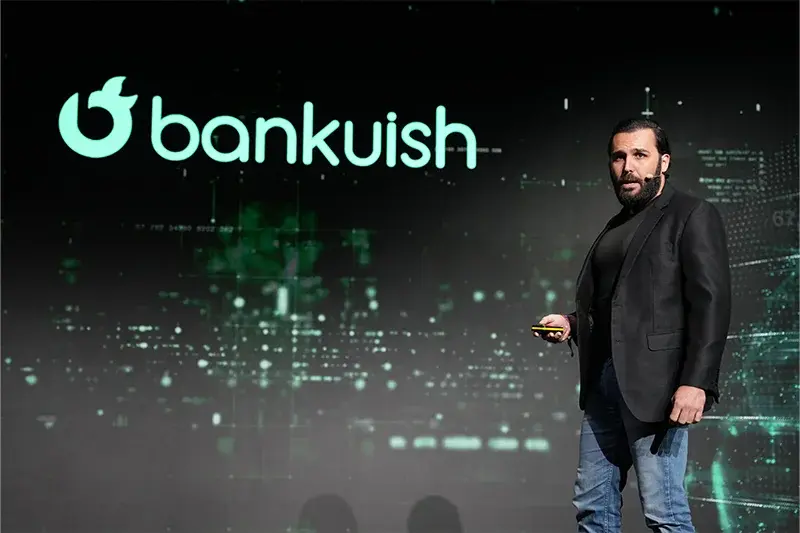The so-called gig economy has become an indispensable source of income for thousands of freelancers, platform workers and creators in Latin America. This model allows access to temporary jobs or the ability to generate income through specific activities, representing an alternative to unemployment or greater freedom from full-time jobs.
Unfortunately, however, this type of work is often excluded by the financial systems in Latin America, generally because the workers do not have a direct link with the companies for which they provide their services, exacerbating financial exclusion in a region with already high rates of informal labor.
Bankuish was born with a clear mission: to provide gig economy workers with a fair measurement of their income that allows them to join the financial system and benefit from access to credit and other benefits.
Its innovative system has led the startup to gain international recognition and expand its solution to various markets since its founding in 2020, and it currently stands out as one of the fintechs with the greatest international projection.
Contxto spoke with its founder and CEO, José Vicente Fernández, to learn in depth about the history of this startup that, like many of those emerging today, began as an entrepreneurial project with the mission of solving a problem in a neglected sector.
From a sofa in Manhattan to a global model
Crossing the Atlantic from Spain almost two decades ago, Fernández faced an unexpected obstacle: with no credit history in the United States, even renting an apartment in Manhattan became an odyssey.
“I had to stay on a friend’s couch for a month until I found a solution,” he recalls. That personal experience, coupled with the observation that millions of freelancers – from gig workers to content creators – were also excluded from the traditional financial system, was the motivation to create Bankuish, the fintech he leads today, which seeks to democratize access to credit for those who live on the margins of conventional banking.
Bankuish aims to turn data from digital platforms into a bridge to ethical financial services.
“Irregular or non-traditional income does not add up to the risk profile of credit bureaus, which leaves out millions,” explained Fernandez. His solution lies in an algorithm that analyzes users’ digital work history – from Uber rides to freelance projects – to generate the Bankuish Score, an indicator accepted by large banking institutions in Latin America and other markets.
The model not only solves an individual problem, but also addresses a systemic gap. As Fernandez explains, the projection is that the gig economy will grow 16.18% annually through 2031, and the maker economy already exceeds $104 billion. “The demand for fair solutions has never been more urgent,” he said.
Global recognition, expansion and a mission to scale
Currently, the startup operates in Brazil, Mexico, the United States, Chile and Colombia, with locations in Miami, Mexico City and São Paulo. But its ambition is global — Asia, Europe and the Middle East are on its radar.
In March, Bankuish was chosen as the winning startup of the 4YFN Awards and received a prize of 20,000 euros, a milestone that Fernandez celebrates as a validation of its impact. The win at 4YFN, according to Fernandez, not only attracts investment, but demonstrates the value of its mission globally.
“This award validates the importance of our model, which allows all these workers to access financial services that were previously inaccessible to them. It also reinforces our position in the fintech ecosystem as a key bridge between financial institutions and the new digital economy. We will continue to work to expand our impact and improve financial inclusion globally,” he stresses.
Funding has been key in this journey. The company has so far raised $6 million in two rounds: Seed and Series A.
On the purposes of the capital received so far, the founder mentioned that they plan to use the capital to scale operations, expand their market reach and strengthen the team with key talent. “We will invest in leveraging our technology as we have been doing in recent years, including developing the Artificial Intelligence behind our AImee assistant and improving our alternative credit scoring model, the Bankuish Score,” Fernandez said.
“It will also help us improve infrastructure, ensuring that Bankuish continues to innovate and strengthen its competitive position in the industry. This international recognition gives us a great impetus to attract strategic allies and continue our expansion,” he said.
Lessons along the way: From banking resistance to innovation
In his journey as an entrepreneur, Fernandez has several lessons to share. “Since the beginning of Bankuish, we have learned that the gig economy is much more diverse and global than we initially imagined,” he says.
One of the biggest challenges, according to Fernandez, has been convincing traditional institutions that digital workers are viable credit subjects.
“It has been a key challenge to demonstrate to financial institutions that these workers have the ability to meet their financial obligations, even without a traditional credit history. This has led us to refine our data model and strategic partnerships, allowing us to scale sustainably,” he explained.
These learnings have shaped the company’s growth strategy, prioritizing strategic alliances and the customization of its services in each market where it operates. “This ensures that more gig workers can access services that reflect their true economic potential,” he says.
This led Bankuish to invest in advanced technology, such as its AI-powered AImee virtual assistant, and in a data model that combines transparency with predictive accuracy.
The future: Credibility, technology and a more inclusive world
Aiming to become a global standard for alternative credit assessment, Bankuish faces its next phase with a dual focus: deepening its impact in Latin America and opening markets in continents where the digital economy is flourishing. “We want no worker, regardless of their form of income, to be left out of the system for lack of credit history,” concludes Fernandez.
In a world where the “non-traditional” becomes the norm, Bankuish not only solves a financial problem: it redefines what it means to be visible to banking. And Fernández, from that sofa in Manhattan, continues to write a story where inclusion is, finally, more than just a slogan.


